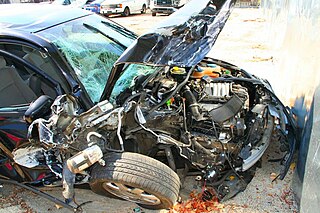Last Update 01/13/16
The first priority in any traffic accident is making sure that people are safe and that injuries are being cared for by medical professionals. However, after the EMS has been called, the doctor has treated your injuries and you know how you (and your passengers) are doing, there comes the question, “what about my car?”
When Is a Car Totaled in a Car Crash?
Assuming that you have auto insurance, your insurance company, and not you alone, will decide if your car has been damaged beyond repair, or “totaled” in a car accident.
In most auto insurance policies, you’ll find a paragraph or two that discusses what happens to your vehicle in an accident, and it will detail the process of “totaling” a vehicle.
If the carrier determines that it will cost more to repair the vehicle than a set percentage of the value of that vehicle, then it will be found to be a “total loss,” or “totaled.”
What happens after a crash?
The insurance company will send out an insurance adjuster to look at the damaged vehicle, take photos, measurements, etc., and then the insurance adjuster will combine that information with the company’s database of information to decide whether or not to “total” your car. They will have their own database for values, for instance.
If your car is older, then the adjuster may “total” the car even if you only suffers a few small dents or scrapes in the accident. Why? Using their version of the Blue Book of car values, they will make their call — not on the reality of your particular situation.
Similarly, if you have a brand new luxury vehicle that is seriously damaged in a wreck, the adjuster may not “total” the vehicle using that same logic and their internal database analysis.
Fighting the Valuation Given Your Car by the Insurance Company
Of course you can challenge what the adjuster has determined regarding your property damage in the crash. It is possible for you to do this alone, negotiating one on one with the insurance company.
However, insurance companies are Goliath to your David, and the odds are against you getting them to change their minds on their adjuster’s decision. Having a lawyer here to help you is important, particularly if your vehicle was expensive and the ratio of what it was worth before accident and the amount the insurance company is willing to pay is way, way off.
Why Fight the Insurance Company Over Your Car?
The biggest reason to fight the value established by the insurance company is that if you accept the amount offered, then you won’t have enough to buy a comparable car.
For example, if you were driving a 5 year old Honda Civic with a luxury interior package, then you want to be able to go buy another 5 year old Honda Civic with similar bells and whistles. It doesn’t have to be the same color, but it’s important to you that it have all the things you were accustomed to having in your car before the crash.
That’s fair, right?
Well, fair or not, the insurance company will need some justification to revise its value on your old Honda Civic. At that point, you may have to have your injury lawyer get involved and seek an independent appraisal of your Honda Civic.
What Happens To Your Car?
If you accept the insurance company’s money for your totalled car, then the insurance company gets your car. They can fix it and sell it; they can auction it off for parts, whatever they decide. It’s their car now.
If you want to keep your car, then you should be able to make to a deal to do so. If you get it back, the insurance company will pay for the car’s cash value less your deductible and less what they think they would have been paid for it at auction. Then you will be responsible for repairs.
What Should You Do?
A good piece of advice if you have been harmed in an accident, is to at least speak with an experienced personal injury lawyer before you file a claim to learn about some of the issues that can arise with these claims, including the type of evidence needed to prove a claim and the type and amount of damages you can recover. Most personal injury lawyers, like Alan Sackrin, will offer a free initial consultation (over the phone or in person) to answer your questions.
Related:
_______________
 Do you have questions or comments? Then please feel free to send Alan an email or call him now at (954) 458-8655.
Do you have questions or comments? Then please feel free to send Alan an email or call him now at (954) 458-8655.

